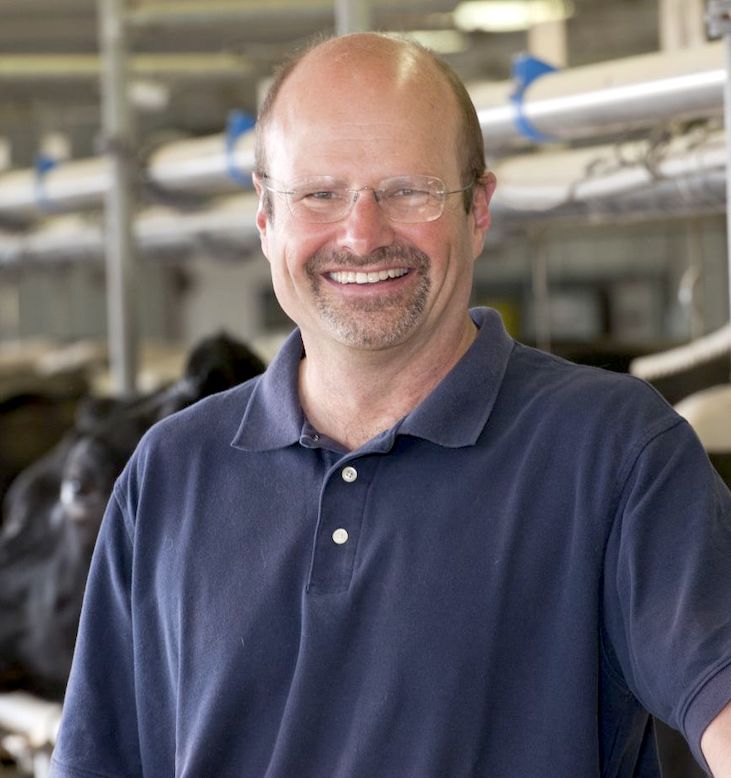
University of Guelph researchers who are leaders in the field of antimicrobial stewardship are receiving more than $3 million from Ontario Research Fund (ORF) for their projects.
Dr. David Kelton received $959,000 for his research into antimicrobial stewardship solutions in the Ontario dairy sector and Dr. Shayan Sharif received just over $2 million for his research into identifying and evaluating novel antimicrobial alternatives in poultry production.
ORF also awarded an Ontario Early Researcher Award worth $150,000 to Dr. Rebecca Shapiro to study drug resistance in fungal pathogens.
Antimicrobial medicines have played a vital role in human and animal health. In agriculture, they are used to treat, control or prevent disease and improve production, growth or reproduction. But bacteria can become resistant to antimicrobial medicine, with serious consequences for human and animal health.
Antimicrobial stewardship promotes the prudent use of products such as antibiotics to limit an increase in resistant organisms and is becoming an integral part of food systems around the globe.
“The University of Guelph is a global leader in advancing One Health knowledge, and antimicrobial stewardship is an essential component of One Health and vitally important to a sustainable future,” said Dr. Malcolm Campbell, vice-president (research).
“This provincial funding for our world-class researchers will help ensure that this crucial work flourishes. I have every confidence this research will contribute to a better future for our world and improve life across the One Health spectrum.”
The ORF funding is part of a $70.4-million investment in 176 Ontario research and innovation projects in the province’s colleges, universities, research institutes and research hospitals.
“This support from the provincial government will go directly to the innovative researchers at the University of Guelph and the work they are doing to benefit Ontario’s agri sector,” said Kitchener-Conestoga MPP Mike Harris. “Funding research like this will help give our economy a competitive edge and create a more prosperous and healthy future for all Ontarians.”
Dr. David Kelton

Kelton, a professor in the Department of Population Medicine, is working with U of G population medicine professors Dr. David Renaud and Dr. Stephen LeBlanc on improving responsible use of antimicrobials in the Ontario dairy sector.
Kelton said pressure is mounting globally to address antimicrobial resistance, and sustainable solutions will require a collaborative, multidisciplinary One Health approach.
“For Ontario’s $2.4-billion dairy sector, solutions start on the farm with sound, science-based approaches to antimicrobial stewardship,” he said. “This research will improve responsible use of antimicrobials in the dairy industry, through educational outreach aimed at more effective targeted antibiotic use and by validating alternatives to antimicrobials.”
This project has also received funding from industry partners, including a nearly $540,000 contribution from Dairy Farmers of Ontario.
“We are proud to partner with the University of Guelph, including Dr. David Kelton and his research team, as we work together toward finding sustainable, science-based solutions to reduce the use of antimicrobials without compromising animal health and welfare,” says Cheryl Smith, Dairy Farmers of Ontario CEO. “We provide leadership and excellence in the production and marketing of Canadian milk. We value consumer trust in our industry and farm practices and work hard to meet their expectations every day.”
Dr. Shayan Sharif

Sharif, a professor in the Department of Pathobiology, is focused on enhancing sustainability in poultry production in anticipation of a ban on antibiotics as feed additives.
“With the imminent changes in the way antimicrobials are used in poultry, research is needed to identify and evaluate novel antimicrobial alternatives,” Sharif said. “Also, there is an urgent need for innovation in strategies that promote antimicrobial stewardship in poultry production.”
Sharif uses genomic science to employ the poultry microbiome to prevent diseases, improve food safety and maintain global food security.
He said the long-term objectives of the research project are to “develop alternatives to antimicrobials in poultry and evaluate the efficacy of such products, and to evaluate production management tools and best practices as alternatives to antimicrobials, all in support of animal health, welfare and sustainable production. ”
Dr. Rebecca Shapiro

Shapiro, a professor in the Department of Molecular and Cellular Biology, received an Ontario Early Researcher Award aimed at helping new researchers working at publicly funded Ontario research institutions build research teams.
The funds will support CRISPR-based strategies used to study drug resistance in fungal pathogens.